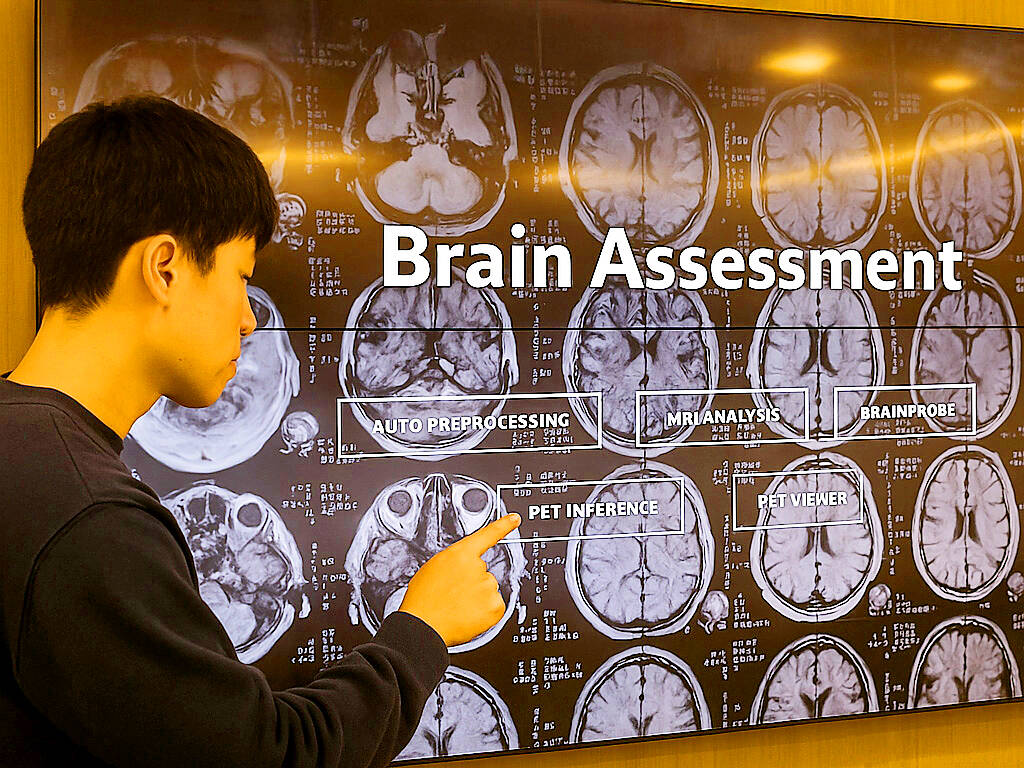The National Yang Ming Chiao Tong University (NYCU) and the Taipei Veterans General Hospital hailed a new milestone for disease diagnosis in the medical industry with a brain imaging system they jointly developed that could isolate levels of cerebral regression suffered by patients with mental diseases at different stages of their lives.
The system, named Brain Probe, won this year’s Edison Awards’ Gold award in the Advancements in Neurological Treatments subcategory.
NYCU’s School of Medicine dean Albert Yang (楊智傑) said that neuropsychiatric diagnoses have long relied on doctor-patient interaction and reference patients’ known family medical history.

Photo courtesy of the National Yang Ming Chiao Tong University
The system allows doctors to precisely quantify the regression rates that different cerebral regions experience due to aging or as a cause of a disorder, he said on Friday.
While initially developed with identifying schizophrenia in mind, the platform could potentially be extended to diagnose major neuropsychiatric diseases.
The team based its solution on long-term observation data of brain aging and disease-related brain regression, and determined the regression model for the gray and white matter areas in 138 brain regions, Yang said.
The model would allow doctors to predict regression trends based on the patient’s age or the stage of their illness, isolate critically abnormal regions and prescribe more targeted treatments, he said.
This development is a far cry from previous technology, which was unable to provide doctors with a distinct causal relation between imagery and symptoms, he said.
The system is already being used for research and clinical assessments of schizophrenia, bipolar disorder and major depressive disorder, Yang said.
Research data generated by the system show that schizophrenic patients experience a significant shrinkage of the general brain size in the 22 years after they are first diagnosed with schizophrenia, while exhibiting greater cortical thickness in the early stages, he said.
Schizophrenic patients have also been shown to see a significant regression in gray matter in the temporal and frontal lobes, as well as the insula, he said.
The system’s data also show that bipolar and depressive patients exhibit anomalies in the anterior cingulate cortex, he said.
Such information is beneficial to doctors, who would be able to more precisely target areas for repetitive transcranial magnetic stimulation or deep brain stimulation therapies, Yang said.

Nipah virus infection is to be officially listed as a category 5 notifiable infectious disease in Taiwan in March, while clinical treatment guidelines are being formulated, the Centers for Disease Control (CDC) said yesterday. With Nipah infections being reported in other countries and considering its relatively high fatality rate, the centers on Jan. 16 announced that it would be listed as a notifiable infectious disease to bolster the nation’s systematic early warning system and increase public awareness, the CDC said. Bangladesh reported four fatal cases last year in separate districts, with three linked to raw date palm sap consumption, CDC Epidemic Intelligence

Two Taiwanese prosecutors were questioned by Chinese security personnel at their hotel during a trip to China’s Henan Province this month, the Mainland Affairs Council (MAC) said yesterday. The officers had personal information on the prosecutors, including “when they were assigned to their posts, their work locations and job titles,” MAC Deputy Minister and spokesman Liang Wen-chieh (梁文傑) said. On top of asking about their agencies and positions, the officers also questioned the prosecutors about the Cross-Strait Joint Crime-Fighting and Judicial Mutual Assistance Agreement, a pact that serves as the framework for Taiwan-China cooperation on combating crime and providing judicial assistance, Liang

Reports of Taiwanese going missing, being detained or interrogated, or having their personal liberties restricted in China increased about fourfold annually last year, the Mainland Affairs Council (MAC) said yesterday. Last year, 221 Taiwanese who traveled to China were reported missing, were detained and interrogated, or otherwise had their personal freedom restricted, up from 55 the previous year, the council said. Reopening group tours to China would be risky, as it would leave travelers with no way to seek help through official channels after Beijing shut down dialogue between the associations tasked with handling cross-strait tourism, the MAC said. Taipei’s Taiwan Strait Tourism

The manufacture of the remaining 28 M1A2T Abrams tanks Taiwan purchased from the US has recently been completed, and they are expected to be delivered within the next one to two months, a source said yesterday. The Ministry of National Defense is arranging cargo ships to transport the tanks to Taiwan as soon as possible, said the source, who is familiar with the matter. The estimated arrival time ranges from late this month to early next month, the source said. The 28 Abrams tanks make up the third and final batch of a total of 108 tanks, valued at about NT$40.5 billion